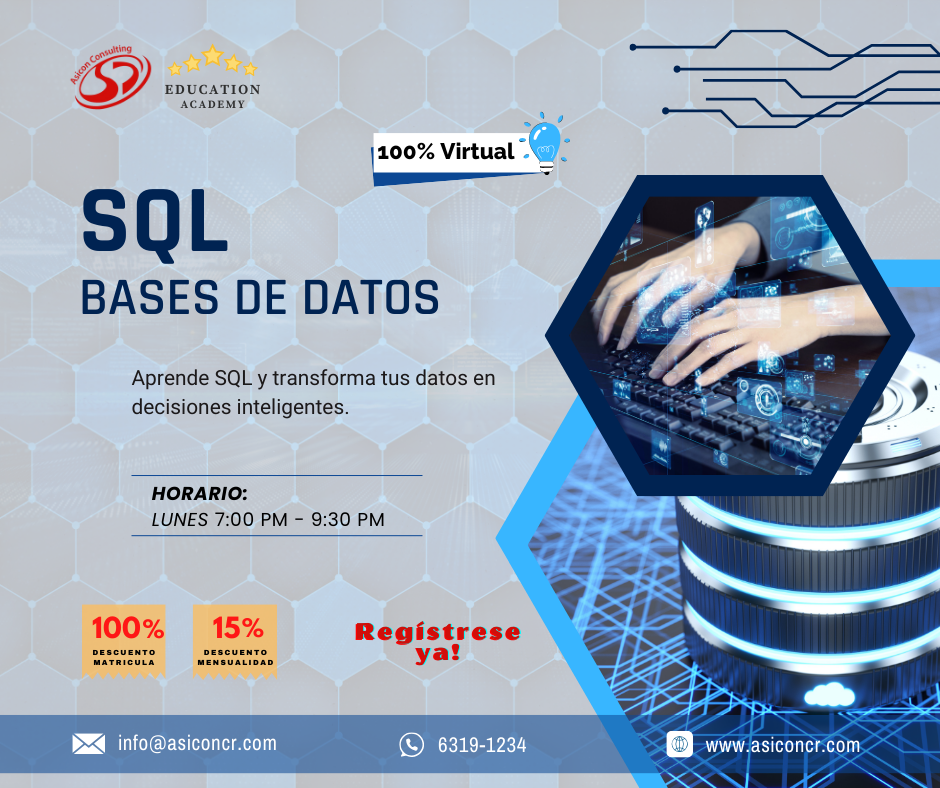SQL (Database) course for beginners

This SQL for Beginners course is designed for those who want to learn the fundamentals of database management. Throughout the course, students will acquire essential skills for writing SQL queries, understanding the structure of relational databases, and performing tasks such as creating, updating, and deleting data. No prior experience in SQL is required, making this course perfect for anyone interested in entering the world of data analysis and database management.
Details of the trainning:

The SQL for Beginners course is designed to provide you with a solid foundation in database management. You will begin by learning the basic concepts of SQL, including creating, modifying, and deleting tables, as well as inserting, updating, and deleting data. This course will guide you step by step through SQL’s essential functions, enabling you to build queries that extract accurate and useful information from a database.
Throughout the course, special emphasis will be placed on developing practical skills through real-world exercises and projects. You will learn to use SQL commands to filter, sort, and group data, as well as apply advanced functions to perform calculations and transformations. Additionally, we will explore how to join multiple tables for a more complete view of the data and how to use subqueries to solve more complex problems.
By the end of the course, you will be able to write effective and optimized SQL queries to manage and analyze data in relational databases. You will have the necessary skills to work with databases in a professional environment, whether in software development, data analysis, or systems administration. This course will prepare you to tackle challenges in handling large volumes of information and provide you with a strong foundation for advancing your knowledge in SQL and other database-related technologies.
- Introduction to Databases and SQL:
- Basic concepts of relational databases.
- Introduction to SQL and its importance in data management.
- Creating and Manipulating Tables:
- Creating tables with different data types.
- Modifying the structure of existing tables.
- Dropping tables and managing schemas.
- Inserting, Updating, and Deleting Data:
- `INSERT`, `UPDATE`, and `DELETE` commands for data manipulation.
- Transaction management and change control for data.
- Basic Selection Queries (`SELECT`):
- Using the `SELECT` command to retrieve data.
- Filtering data with the `WHERE` clause.
- Sorting results with `ORDER BY`.
- Aggregate Functions and Data Grouping:
- Using functions such as `COUNT`, `SUM`, `AVG`, `MIN`, and `MAX`.
- Grouping data with the `GROUP BY` clause.
- Filtering groups with `HAVING`.
- Table Joins (`JOINs`):
- Understanding `INNER JOIN`, `LEFT JOIN`, `RIGHT JOIN`, and `FULL JOIN`.
- Using `JOINs` to combine data from multiple tables.
- Subqueries and Nested Queries:
- Creating and using subqueries in SQL.
- Nested queries to solve complex problems.
- Functions and Expressions in SQL:
- Using string, date, and math functions.
- Creating custom expressions to transform data.
- Access Control and Permissions:
- Managing users and permissions in databases.
- Controlling access to tables and views.
- SQL Optimization and Best Practices:
- Optimizing queries to improve performance.
- Best practices for writing efficient SQL.
- Master the fundamental concepts of relational databases and SQL, gaining a solid understanding of how to design, create, and manage data structures using SQL.
- Learn to manipulate data effectively, including inserting, updating, deleting, and retrieving data, using essential SQL commands such as `INSERT`, `UPDATE`, `DELETE`, and `SELECT`.
- Develop skills to perform advanced queries, including the use of aggregate functions, subqueries, and table joins (`JOINs`), allowing you to extract and combine data from multiple sources efficiently.
- Gain knowledge of best practices in SQL query optimization, as well as database security and permissions management, ensuring controlled access and optimal query performance.
- Monday to Friday:
- Duration: 26 hours.
- Frequency: Once a week on Mondays.
- Session length: 2.5 hours.
- Total: 11 sessions (11 weeks).
- Schedule: 7:00 p.m. to 9:30 p.m.
- Saturdays:
- Available upon request.
- University students in computer science or technology-related fields who want to learn about databases and SQL.
- Professionals in software development seeking to acquire or strengthen database skills.
- Data analysts who need to understand and manage relational databases for their daily work.
- Beginner database administrators who want to formalize their knowledge of SQL.
- Entrepreneurs and business owners who want to manage their own database systems.
- Individuals interested in switching careers to software development, data analysis, or database administration.
- Technology consultants who need to improve their ability to work with SQL databases in client projects.
- Application developers who need to integrate and optimize databases in their projects.
- Marketing professionals seeking to improve their ability to analyze data through SQL queries.
- Anyone with no prior SQL experience who wants to learn from scratch how to work with relational databases.
- Modalidad en Línea:
- 100% en línea
- Aprendizaje sincrónico (tiempo real)
- A través de la plataforma de Teams.
- Modalidad presencial en sus oficinas.
- Cursos para empresas.
- Modalidad presencial en nuestras oficinas.
- Opción no disponible para este curso.
- Español:
- Disponible en la mayoría de nuestros cursos.
- Inglés:
- Disponible previa solicitud específica.
- La inversión económica del curso varía según la configuración de las opciones y características previamente mencionadas. Entre estas variables se incluyen el idioma, modalidad virtual o presencial, ubicación (en las oficinas de la empresa o en un lugar facilitado por Asicon), así como la duración y frecuencia de las sesiones, entre otras.
- Ofrecemos tarifas especiales para nuestra comunidad, clientes actuales y estudiantes de programas anteriores.
- Ofrecemos descuentos para grupos de estudiantes, empresas y si inscribes a una, dos o más personas en el curso. Consulta nuestros planes de descuento.
- Certificado por participación a quienes aprueben el 80% de las actividades programadas.
- Insignia o badge digital para redes sociales y profesionales.
- Manual digital del contenido del curso.
- Material descargable del curso (Archivos Excel, tablas de datos, archivos XML, etc.).
- Acceso a la comunidad y al grupo de docentes para realizar consultas y recibir consejos en implementaciones posteriores en ambientes reales de trabajo.
- El enlace y el material didáctico digital se enviarán el día de inicio del curso a todas las personas que hayan completado el pago.
- Una vez recibido el enlace, no debe compartirlo, ya que es de uso exclusivo.
- Sea puntual. El profesor verificará la asistencia de cada participante. Por favor, mantenga la cámara encendida. Solo la persona inscrita en el curso puede estar presente; no se permiten terceros.
- Las grabaciones de cada sesión no se comparten ni con los participantes ni con terceros.
- Se asume que los participantes poseen los conocimientos específicos requeridos. El profesor no detendrá el flujo normal del curso ni regresará a explicar contenidos previos.
- Si el estudiante falta al 20% del curso, perderá el derecho a continuar sin opción a reembolso o reprogramación.
- Para coordinar cursos especiales para empresas en modalidad presencial, se requiere un espacio físico con proyector.
- Se ofrecerán descuentos escalonados para grupos de más de 10, 15 o 20 participantes.





























